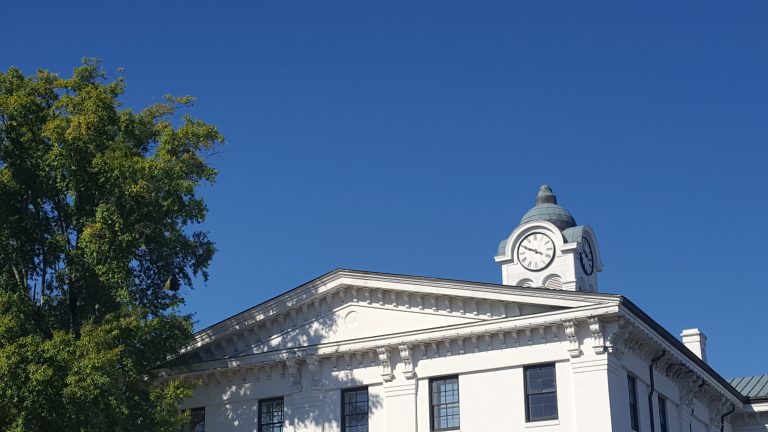 I’ve had a longstanding like/dislike relationship with NPR. And when I say NPR I’m mostly using the initials as shorthand for the early morning and late afternoon news broadcasts on National Public Radio. The likes outweigh the dislikes. I have a ton of respect for the sheer day-in and day-out professionalism of the broadcasts. NPR is certainly to be preferred to most of the news outlets on TV and radio. The exceptions being the Lehrer NewsHour on PBS, BBC Radio, which you can tune in late at night here in Oxford, and the lefty cable news channel, Link, where you can hear stuff NPR and Lehrer won’t touch. CNN also has its place. Bottom line: We’re better off with NPR than without it.
I’ve had a longstanding like/dislike relationship with NPR. And when I say NPR I’m mostly using the initials as shorthand for the early morning and late afternoon news broadcasts on National Public Radio. The likes outweigh the dislikes. I have a ton of respect for the sheer day-in and day-out professionalism of the broadcasts. NPR is certainly to be preferred to most of the news outlets on TV and radio. The exceptions being the Lehrer NewsHour on PBS, BBC Radio, which you can tune in late at night here in Oxford, and the lefty cable news channel, Link, where you can hear stuff NPR and Lehrer won’t touch. CNN also has its place. Bottom line: We’re better off with NPR than without it.
 Whenever NPR comes up as a subject of conversation, the fly in the ointment—as far as NPR is concerned—is the question of whether it is a “liberal” news medium or not. To the far right anyone or any institution that doesn’t consider Barack Obama the anti-Christ is, by definition, liberal. According to this mind-set NPR, therefore, is nothing less than a part of the hated mainstream liberal media conspiracy to turn us all into zombies. Apparently liberalism, like beauty, is in the eye of the beholder.
Whenever NPR comes up as a subject of conversation, the fly in the ointment—as far as NPR is concerned—is the question of whether it is a “liberal” news medium or not. To the far right anyone or any institution that doesn’t consider Barack Obama the anti-Christ is, by definition, liberal. According to this mind-set NPR, therefore, is nothing less than a part of the hated mainstream liberal media conspiracy to turn us all into zombies. Apparently liberalism, like beauty, is in the eye of the beholder.
Consider this: At the beginning of the second Iraq war complaints arose concerning the Armed Forces radio network’s broadcasting a daily diet of Rush Limbaugh to the troops. The military brass responded by adding NPR to the rotation, as if NPR and Rush Limbaugh were somehow of equal political or ideological weight, merely different sides of the same coin. Again, the eye of the beholder.
It seems to me NPR does itself a disservice by wearing its liberal label like an albatross around its neck. You can’t win over the right wing by appeasement, as Obama is finally learning. So why bother? All it does is dumb down your news broadcasts. NPR’s reluctance (refusal?) to call a spade a spade when it comes to vetting the policies of the Republican Party is an abdication of journalistic principles. The victim in such circumstances is the truth. All of this hand-wringing on NPR’s part is primarily a legacy of Newt Gingrich’s vow in 1994 to pull the plug on public radio’s funding. NPR has been running scared ever since.
The day after President Obama’s recent State of the Union address NPR convened a group of experts from different disciplines who vetted the speech on the radio. To me this is good journalism. The trouble is I don’t remember NPR doing anything of the kind with W. Bush. Maybe I’m wrong. Maybe I missed it. But I don’t remember NPR ever laying a glove on Bush in eight long years. Such is their fear of being tagged liberal by the right.
 NPR’s Don Gonyea, who was their White House correspondent during the Bush years, day after day stepped up to the NPR microphone and said something like: President Bush said today his tax cuts are creating jobs, the war in Iraq is being won, and privatizing social security is a good thing because the stock market is never going to go down again. -Don Gonyea, the White House.
NPR’s Don Gonyea, who was their White House correspondent during the Bush years, day after day stepped up to the NPR microphone and said something like: President Bush said today his tax cuts are creating jobs, the war in Iraq is being won, and privatizing social security is a good thing because the stock market is never going to go down again. -Don Gonyea, the White House.
This guy should have been on the Bush payroll as a stenographer. Did Bush need a Press Secretary with Don Gonyea around? I don’t know what Don Gonyea and NPR thought they were doing “covering” Bush this way for eight years. But it wasn’t journalism.
Neal Conan, who presides over a genteel afternoon talk show for NPR, has taken great pains over the years to explain his journalistic philosophy to his listeners, a philosophy that seems to mirror NPR’s. When prompted, usually by a phone call from someone like me, Conan will plead his case in exasperated tones, saying something like: Who can say who is telling the truth? It’s impossible. All I or anyone can do is report what the Republicans say on one hand, then let the Democrats tell their side of the story. It’s impossible to know who’s telling the truth.
Whatever such a philosophy represents, it’s not journalism. Such a mission statement explains why Conan’s show often resembles a parlor game that fosters the kind of endless, polite, academic discussion that never gets to the bottom of anything.
 It’s also clear Conan has taken to heart the NPR memorandum handed down concerning treatment of liberals like documentary filmmaker Michael Moore, NPR’s favorite whipping boy. When Conan had Moore on his show some time ago he went after him like a piranha. You’d think Moore had just bankrupted the country and turned Iraq into a graveyard. The entire “interview” was one big cheap shot.
It’s also clear Conan has taken to heart the NPR memorandum handed down concerning treatment of liberals like documentary filmmaker Michael Moore, NPR’s favorite whipping boy. When Conan had Moore on his show some time ago he went after him like a piranha. You’d think Moore had just bankrupted the country and turned Iraq into a graveyard. The entire “interview” was one big cheap shot.
Moore is routinely vilified by NPR and held up as a kind of poster boy for irresponsible left-wing mischief-making. Why? Because he calls a spade a spade and has no problem confronting the right-wing with evidence of their corrupt agenda. Yet NPR will treat some crackpot hustler like Herman Cain or Sarah Palin with kid gloves.
I have a name for the type of liberal that seems to predominate and call the shots at NPR (it’s not a complimentary one)—the kind of politically correct people who go only so far in their reading of the political landscape and refuse to take the next logical step and call a spade a spade. Give me a hardnosed, take-no-prisoners liberal (and there aren’t many of them around) like Michael Moore any day. Or James Carville. Or Harold Ickes, Jr., formerly of the Clinton administration. Or the late William Holbrooke, who should have been Obama’s choice as Secretary of State. By contrast there are about a zillion right-wingers who fight bare-knuckled.
 The thing about producing news that won’t call a spade a spade is that it can ultimately distort the truth. Sarah Chayes is a former NPR correspondent who was stationed in Afghanistan. When she worked for NPR they didn’t like her copy. It wasn’t upbeat enough. What Chayes was doing was giving NPR the straight stuff as she saw it on the ground in Afghanistan. She and her editors fought. The editors won. NPR and Chayes parted ways and Chayes wrote a strong book, The Punishment of Virtue, about the U.S. military’s involvement in Afghanistan. Sarah Chayes is the kind of reporter I want to hear on NPR. Because NPR didn’t want to come across as being negative, i.e. “liberal,” in regards to the U.S. war in Afghanistan they ran her off. The cost? The truth and a first-rate reporter.
The thing about producing news that won’t call a spade a spade is that it can ultimately distort the truth. Sarah Chayes is a former NPR correspondent who was stationed in Afghanistan. When she worked for NPR they didn’t like her copy. It wasn’t upbeat enough. What Chayes was doing was giving NPR the straight stuff as she saw it on the ground in Afghanistan. She and her editors fought. The editors won. NPR and Chayes parted ways and Chayes wrote a strong book, The Punishment of Virtue, about the U.S. military’s involvement in Afghanistan. Sarah Chayes is the kind of reporter I want to hear on NPR. Because NPR didn’t want to come across as being negative, i.e. “liberal,” in regards to the U.S. war in Afghanistan they ran her off. The cost? The truth and a first-rate reporter.


